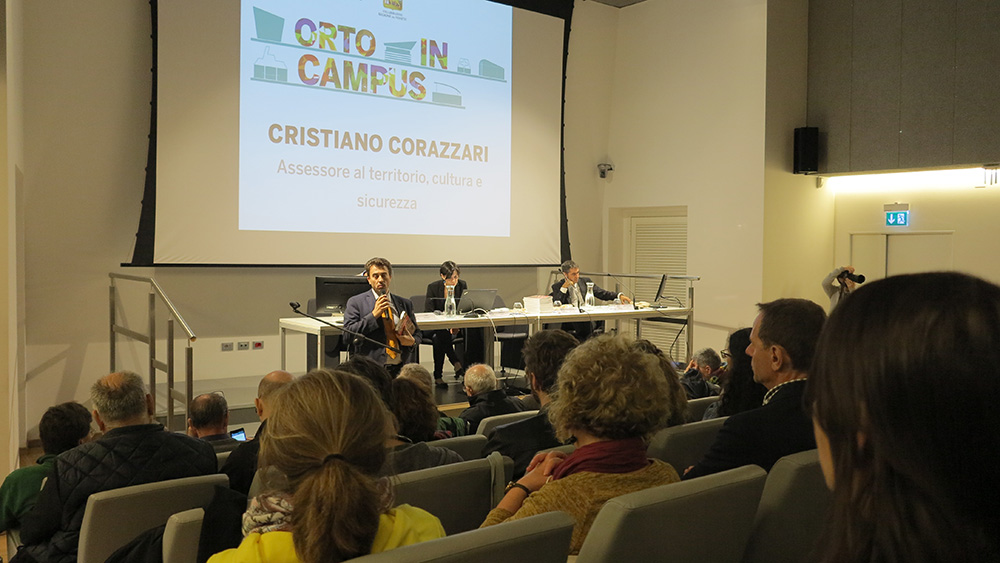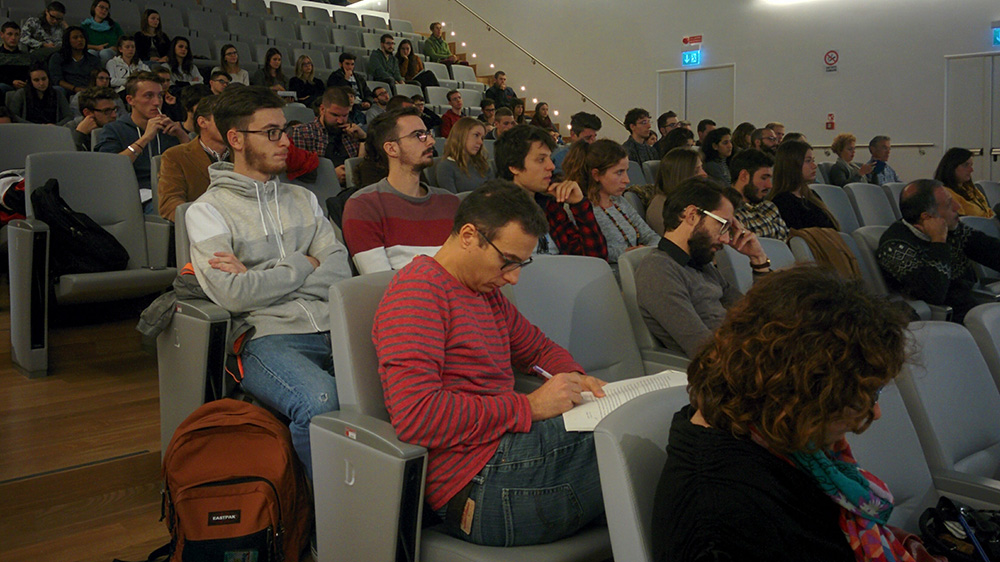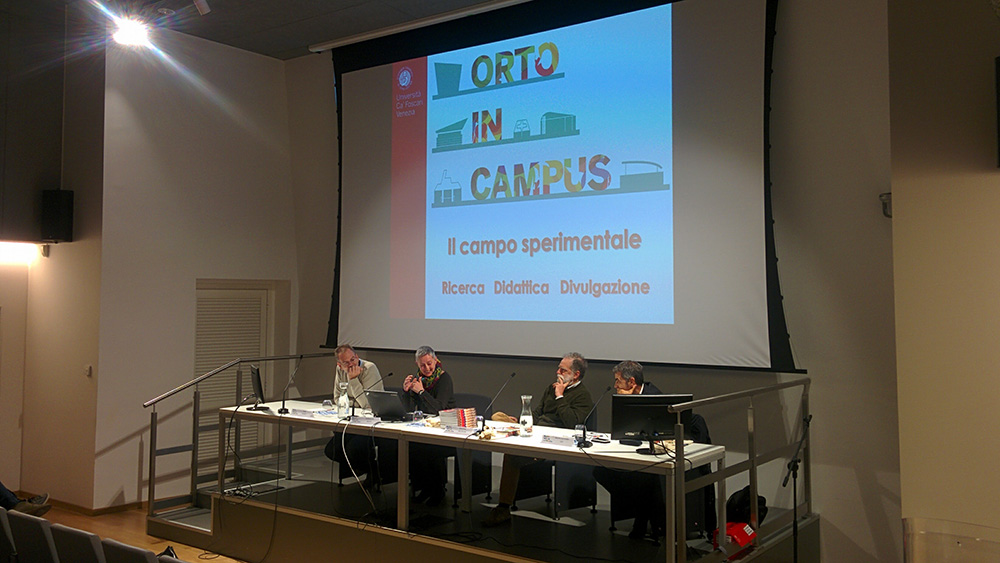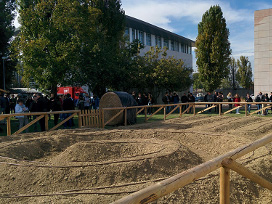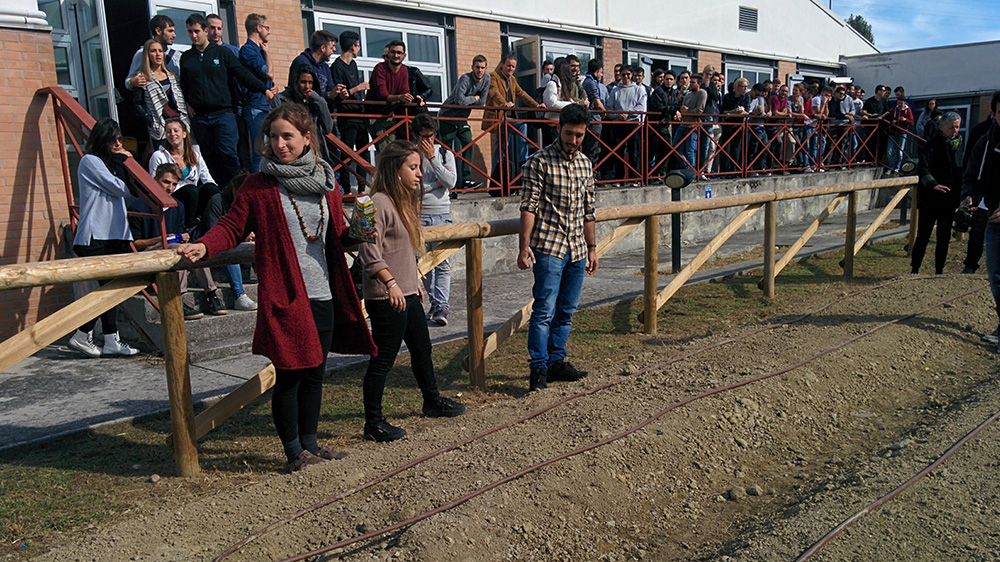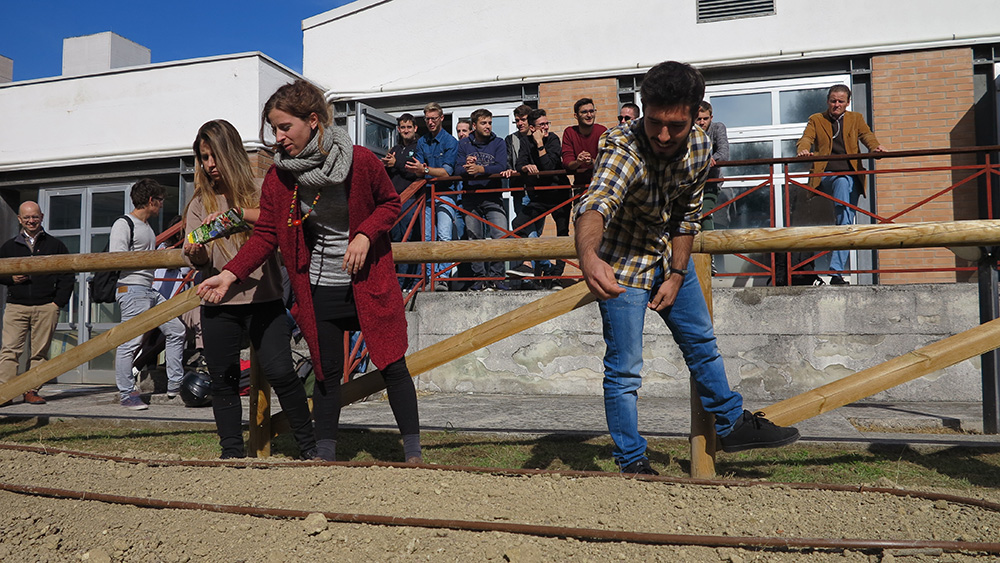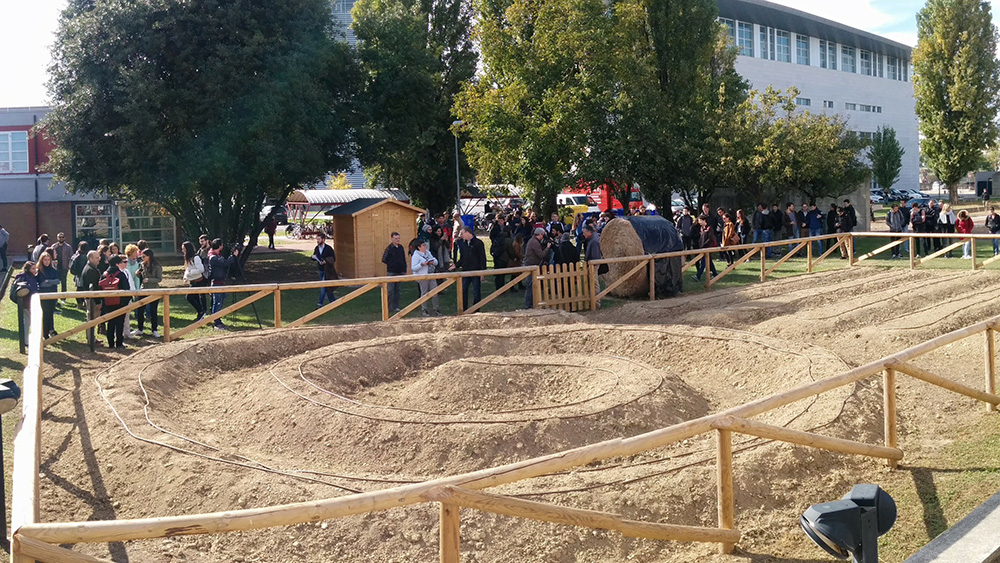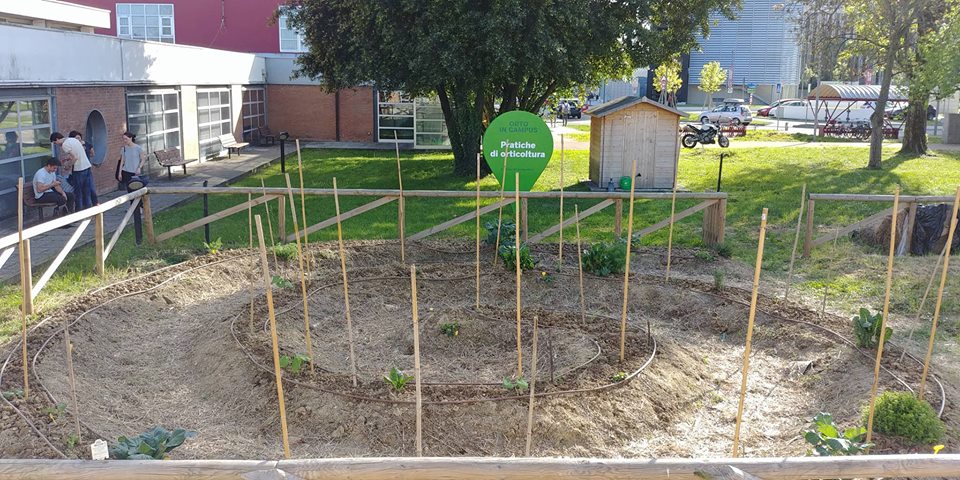Orto in Campus

As part of the Sustainable Campuses initiative, Ca’ Foscari Scientific Campus started the project “Orto in Campus”. The project consists of two parts: a biodiversity garden with rare autoctone or endangered species, and a synergic garden in which horticulture techniques will be practiced.
It is a tool for research and dissemination of scientific knowledge. The project was activated within Sustainable Ca’ Foscari, with an important contribution from Ca’ Foscari Real Estate and Purchasing Area, and will involve researchers of the Ecology group at the Department of Environmental Sciences, Informatics and Statistics.
professor Fabio Pranovi
fpranovi@unive.it
professor Gabriella Buffa
buffag@unive.it
Patrizia Resente
resente@unive.it
ortoincampus@unive.it
Discover the Orto in Campus
The Orto in Campus is managed by a group of students, who are taking part to the project. They are managing all the phases: the seeding, the harvest, the monitoring and the study of the plants behaviours.
The video describes the first year of the project.
If you want to be part of the group contact us at the following address sostenibile@unive.it!
Past events
"On the Green Road" Screening
July 7th, 2018 - h. 18.00, Auditorium Danilo Mainardi, Scientific Campus.
Free screening of the documentary "On the Green Road". Filming began in 2012, when two French cousins, Siméon Baldit de Barral and Alexandre Haslé de Barral, decide to bike across 26 states, with the aim of finding out new eco-friendly practices in developing countries. This documentary brought to the founding of an association with the will to stimulate the debate on environmentally-friendly lifestyles all around the world.
Documentary running time: 80' - subtitled.
After the screening, the viewers had the chance to chat with the director via Skype.
Spring Fest - Fontego dei Turchi
March 18th, 2018 - Festa di Primavera al Fontego dei Turchi.
The Fontego, home of the Natural History Museum, welcomed representatives of businesses and institutions focused on the vegetable field. Ca' Foscari University of Venice has also attended through its research team in Vegetable Ecology, from the Department of Environmental Sciences, Informatics and Statistics, who presented the "Orto in Campus" project.
New Realities of Sustainable Agriculture
April 23, 2018 - Conference Room, Scientific Campus of Mestre.
The conference revolved around topics like the connection between science and agriculture, sustainable development and environmental protection. si è tenuto il seminario.
Luca Asperi, biologist and organic horticulturist, e Giovanni Campagnaro, owner of the farm Cerere, shared their experiences with the students.
Impact of Monocultures on Landscape and Biodiversity
May 16th, 2018 - Conference Room, Scientific Campus of Mestre
The main speaker of the conference, naturalist and writer Michele Zanetti, talked about how monocultures have negatively affected the Venetian countryside. He also proposed feasible alternatives to the current agricultural trends.
Festival of solidarity economy and relations “Si può fare”
The Festival of solidarity economy and relations "Si può fare"[IT] took place in Mira from September 30th to October 1st: a meeting place for associations, companies, craftsmen, farmers who work with environmental sustainability and social welfare in mind. The festival included exhibitions, labs and good practice workshops on five main themes: Earth and food, energy and inhabitancy, mobility and territory, work and economics, consumption and reuse.
Ca’ Foscari took part in the festival on Saturday September 30th with the introduction of the Orto in Campus project through an exhibition and two presentations hold by the Department of Environmental Sciences, Informatics and Statistics: “Urban biodiversity: the importance of quality of life” and “The experience of a synergic orchard at Ca’ Foscari” curated by a group of students who were involved in the “Orto in Campus” project.
Students participation
Any student enrolled at Ca’ Foscari can take part in the project and be involved in managing the orchard and the garden and in the seminars that will be held in November on synergic horticulture and cultivating endangered species, involving associations in urban orchards locally active in Mestre and Marghera.
For more information contact us at the following address sostenibile@unive.it
sustainability competency
This activity can be recognized as a sustainability competency, with the agreement of the professors coordinating the student’s department.
The synergic orchard
The concept of a synergic orchard is based on the principles of organic agriculture written by the Japanese agronomer Masanobu Fukuoka and the Spanish farmer Emilia Hazelip: farming as naturally as possible relying on mulch to keep soil fertile in time and favoring a no-till agriculture to let animal and vegetal microorganisms develop in the soil.
Four elements are not involved in such an approach:
- tilling;
- chemical fertilizing;
- weeding;
- depending on chemical products such as pesticides.
The orchard tends to find a natural balance growing natural products. The spiral form given by the flower beds represents the link of nature with the universe, the phases of the moon, seasons and atmospheric weather from which we all depend and serves to improve the connection between all the cultivated species.
The orchard becomes an open-air laboratory of sorts in which students, especially those enrolled in environmental sciences, will be able to experiment and test bio-ecological concepts they studied in class.
The Garden of Biodiversity
The idea of a Garden of biodiversity at the Scientific campus emerged by the realization that we can only get closer to sustainability by acknowledging the existence of a “natural capital” and by attempting to implement and maintain it. Destruction of natural habitats, pollution, competitive pressure of exotic species, genetic pollution, global warming are among the many pressures that caused the extinction of more than a fifth of the plant species on our planet.
In Europe, 650 plants are considered extinct or in a critical situation. A recent study has enhanced how since the 1980s in the Veneto region 48 species have been lost. 1,500 are currently at risk, representing 43% of all the regional vegetation. Plants are an essential resource for our planet and man depends on them for all aspects of life: food, clothing, health, leisure.
In the Garden of Biodiversity a small collection of rare or at risk plants from the Veneto region will be presented as an opportunity for environmental education and as a resource for research and experimentation.
Opening ceremony
Tuesday October 11th at noon at the Auditorium Alfa at the Ca’ Foscari Scientific Campus the opening ceremony of the orchard on campus launched the initiative.
After the welcome addresses of Fabio Pranovi, representing Ca’ Foscari rector, of Cristina Corazzari, culture and security councillor for the region of Veneto, and Agostino Cortesi, Deputy Head of the Department of Environmental Sciences, Informatics and Statistics, the following people spoke:
- Fabio Pranovi - Rector's Delegate for sustainability, Ca’ Foscari University of Venice
- Gabriella Buffa - professor of botanics, Department of Environmental Sciences, Informatics and Statistics
- Mauro Giovanni Viti - Administrative Manager of the Economic Development, Regional Strategy for Biodiversity and Parks
- Giustino Mezzalira - Administrative Manager of Research and Agroforestry Management, Veneto Agricoltura
During the event, the project “Orchard on Campus” was presented as well as a call for participation for students and the “Regional red list of vascular plants. Region of Veneto”, a list of rare and endangered species in the Region of Veneto.
Finally three students planted the first seeds of endangered plants.
Regional red list of vascular plants. Region of Veneto
This milestone is the first list establishing the state of conservation of plant species in the Region of Veneto. The book introduced a list of rare and endangered species in the region of Veneto (1,509 species, 43% of the local flora) and the evaluation of their extinction risk using the criteria established by the International Union for the Conservation of Nature (IUCN) adapted to the local scale. This inventory is mainly addressed to experts but can be read by a wider audience interested in plants, students in schools and universities, administrators, and by all of those who work in related fields and wish to improve their knowledge of our “natural capital”.
Despite the fact that the Red Lists are dynamic documents which can never be regarded as definitive, the data presented in this book gathers synthetic information on the conservation state of vegetal species and will be a useful basis for regular monitoring on the efficiency of implemented actions and actions to be undertaken to contrast risk factors and stop biodiversity loss in Veneto.
Last update: 05/05/2025

